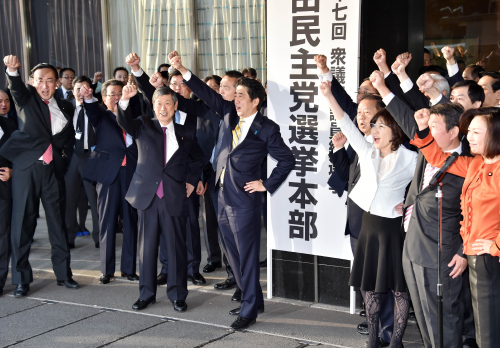 |
|
ELECTION CAMPAIGN: Japanese Prime Minister Shinzo Abe (center) shouts slogans with his Liberal Democratic Party's lawmakers at the party's headquarters in Tokyo on November 21, after he dissolved the lower house of the parliament (XINHUA/AFP) |

Japanese Prime Minister Shinzo Abe dissolved the House of Representatives, or the lower house in the country's bicameral parliament, on November 21. A consequent snap election will be held on December 14, two years ahead of schedule.
In recent months, the Japanese economy has continued to slide and entered a technical recession. Abe, who came to power in late 2012 with a pledge to reinvigorate the economy, has been unable to put a stop to the public's declining support for his administration. Worse still, after a reshuffling of the cabinet in September, scandals involving several heavyweight ministers were exposed to the public in succession. Subsequently, Abe is fully aware of the challenges facing the ruling Liberal Democratic Party (LDP) ahead of the parliament election that was originally scheduled to be carried out in 2016.
If the election is held in mid-December, Abe and his ruling coalition are still expected to be victorious due to the weakness of the opposition—a win that would prolong his ruling position to 2018.
Economic woes
Abe launched an ambitious economic plan, known as "Abenomics," two years ago when he became prime minister. He promised that his plan, mainly consisting of an aggressive monetary policy, a proactive fiscal policy and structural reforms, would make Japan's economy recover in the summer of 2014. However, the results have not aligned with Abe's optimistic expectations. Current economic data shows that Abe's cabinet cannot meet the goal.
The Japanese economy has continually slowed since a rise in the sales tax in April, from 5 percent to 8 percent. Japan's GDP growth rate in the second quarter was minus 7.1 percent and in the third quarter was minus 1.6 percent. According to economics theory, negative GDP growth over two consecutive quarters indicates a recession.
The growth forecast for the Japanese economy has been revised downward from 1 percent to 0.5 percent by Japan's central bank. Many Japanese people have lost confidence in Abe's economic agenda. A poll conducted by The Asahi Shimbun, a widely read Japanese daily newspaper, indicated that 45 percent of the correspondents did not expect Abenomics to bring growth and one third of them said that they did not benefit from current policies.
Nomura Securities, a renowned Japanese financial services group, has also lowered the GDP growth forecast for 2015 from 1.7 percent to 0.8 percent.
Given this economic data, Japan's economic outlook is not optimistic for the next two years. If this trend cannot be reversed, it's very likely that the LDP will lose its ruling status in the next parliamentary election.
Japan's legislative body comprises the upper House of Councilors and the lower House of Representatives. Comparatively, the 480-seat lower house is more powerful, able to override vetoes on bills imposed by the upper house with a two thirds majority.
Japan's House of Representatives is elected for a term of four years. The tenure of the current crop of representatives lasts from December 2012 to December 2016. If the election of Japan's lower house is held in December 2016 on schedule, Abe's administration will likely lose support due to policy problems—a result that would be a crushing defeat for Abenomics. To avoid such an outcome, Abe dissolved the House of Representatives—a power that is given by the Japanese Constitution—aiming to gain an upper hand over ill-prepared opposition parties.
